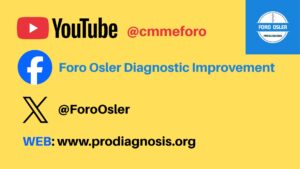A short and melancholic story

Author: Dra. Edita Falcó. Surgeon. Uruguay. Member of Prodiagnosis
Translation: Lorenzo Alonso
I remembered the old times when I read Dr. Vitolo’s entry, about a translation of an article by Abraham Verghese about the medical work, and discovered that we were evoking the same things, all related with the role that the medical error has in our present practice.
The small town in the interior where I grew up was in communication with another small sister city separated by a few kilometers and the settlers we knew as a family. Medical attention at that time was private, but affordable (the middle class saved money to-not-have-to go to the hospital.)
The doctors there were no more than a half a dozen. Each family had its doctor and considered natural and with special pride that he or she was better than the one of their neighbors. They attended in their office, but spent most of their time in home visits, and that was a real challenge: the sheets of the day were replaced by the best embroidered sheets, the common towels replaced by other linen and long fringes, and the doctor was eagerly awaited with respectful expectation. And then, after the anamnesis and the physical examination, finishing washing hands, the doctor emitted a diagnosis, prognosis and decided a treatment for the patient.
It should be remembered that the doctor knew everything about the family medical history. Across the days that I spent there, I do not recall that clinical examinations or specialist consultations were requested except for some surgical case that was immediately transferred to the “sanatorium”.
The inhabitants were interconnected like a neural network, without wi-fi ,everyone knowing what was going on at the moment. In an age without political disturbances or economic crises, life did not have much trouble.
Few news generated what is now known as public alarm, and among them the ones from a doctor´s mistake were the most commented. A late diagnosis or a diagnosis detected for another colleague was a very serious situation. The family cut off the relationship with the doctor, sought a substitute and the story of an ill-managed patient was commented again and again.
There were thus first-class doctors, those who had nocturnal visits without hesitation and who did not miss the diagnosis and doctors of a second class. There were doctors who occasionally had to leave the town after an improper handling. This was the risk for a medicine practised with just the proper hands, eyes, ears…and a chair.
Today, patients have access to complex diagnostic tests, tomographies, hormonal profiles, and it is difficult for patients to think in the responsibility of a doctor..and the internet ,
However the diagnostic errors still exist and how !!
At this moment, it would be a good thing to control the time and to be able to observe in real time those doctors who worked for decades without the social alarm being ignited by a diagnostic error with the limited technical help.



